Training Courses For Mortgage Lending & Compliance
Training Courses For Mortgage Lending Professionals
Below please find specifics on the various types of mortgages, as well as training courses for each.
What Are The Components Of Mortgage Lending?
Mortgage lending involves several components, each of which plays a crucial role in the process of borrowing money to purchase real estate. Here are the main components:
- Borrower:
The individual or entity seeking to obtain a mortgage loan to purchase property. Borrowers must meet certain eligibility criteria, including creditworthiness, income stability, and debt-to-income ratio.
- Lender:
The financial institution or mortgage company that provides the funds for the mortgage loan. Lenders assess the borrower's creditworthiness, determine the loan amount, interest rate, and other terms, and ultimately approve or deny the loan application.
- Loan Application:
The formal request submitted by the borrower to the lender, providing detailed information about the borrower's financial situation, employment history, assets, liabilities, and the property being purchased. 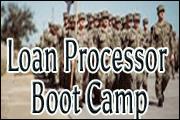
- Loan Officer:
A representative of the lender who assists borrowers in the mortgage application process. Loan officers evaluate applicants, help them choose the right mortgage product, and guide them through the documentation and underwriting process.
- Underwriting:
The process by which the lender evaluates the borrower's financial information, credit history, and the property being financed to assess the risk and decide whether to approve the loan.
- Credit Report and Score:
Lenders assess the borrower's creditworthiness by obtaining a credit report from one or more credit bureaus and calculating their credit score. This information helps lenders determine the borrower's likelihood of repaying the loan.
- Pre-Approval:
Before house hunting, borrowers can seek pre-approval from a lender, which involves a preliminary assessment of their creditworthiness and the maximum loan amount they qualify for based on their financial situation.
- Down Payment:
The initial payment made by the borrower towards the purchase price of the property. The down payment amount is typically expressed as a percentage of the property's purchase price and can vary depending on the type of mortgage and lender requirements.
- Terms Of The Loan:
This includes the specific terms and conditions of the mortgage loan, such as the interest rate, loan duration (or term), repayment structure (e.g., fixed-rate or adjustable-rate), and any applicable fees or penalties.
- Closing:
Also known as settlement, this is the final step in the mortgage lending process where the borrower signs the loan documents, pays any remaining closing costs, and takes ownership of the property. The lender disburses the loan funds to complete the purchase transaction.
What Are The Common Problems In Mortgage Lending?
Common errors in mortgage lending can vary, but here are some frequent ones:
- Incomplete Documentation:
One of the most common errors is incomplete or inaccurate documentation provided by the borrower. This can include missing pay stubs, tax returns, bank statements, or other required financial documents.
- Incorrect Information On The Application:
Borrowers may provide incorrect information on their mortgage application, such as their income, employment history, or assets. This can lead to delays in processing or even loan denial.
- Credit Issues:
Issues with the borrower's credit history, such as late payments, collections, or errors on the credit report, can cause delays or result in the loan being denied.
- Inadequate Credit Checks:
Failing to conduct thorough credit checks or overlooking important credit history details can lead to loans being granted to borrowers who may not be creditworthy.
- Failure To Disclose Liabilities:
Borrowers may fail to disclose all of their liabilities, such as other loans or financial obligations, which can impact their ability to qualify for a mortgage or affect the terms of the loan.
- Debt-To-Income Ratio Problems:
Lenders typically have specific debt-to-income ratio requirements, and if a borrower's ratio is too high, it can result in the loan being denied or require additional documentation and explanation from the borrower. nOTE: Ignoring the borrower's debt-to-income ratio can result in approving loans to individuals who may struggle to make their mortgage payments alongside existing debts.
- Property Appraisal Issues:
If the property appraisal comes in lower than the agreed-upon purchase price, it can create problems with the loan amount and may require renegotiation between the buyer and seller. 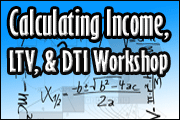
- Property Valuation Errors:
Incorrectly appraising the value of the property can lead to loans being approved for more than the property is worth, increasing the risk of default.
- Employment Verification Issues:
Lenders verify a borrower's employment status and income, and any discrepancies or issues with employment verification can delay the loan approval process.
- Failure To Assess Borrower's Ability To Repay:
Lenders must assess whether borrowers can afford their mortgage payments over the long term. Failing to do so can lead to defaults and foreclosures.
- Inadequate Communication:
Poor communication between lenders, borrowers, and other parties involved in the mortgage process can result in misunderstandings, delays, and errors.
- Failure To Educate Borrowers:
Not providing sufficient information to borrowers about their mortgage options, terms, and responsibilities can result in misunderstandings and financial difficulties down the line.
To mitigate these errors, mortgage lenders must implement robust procedures, employ qualified staff, utilize technology effectively, and stay updated on relevant regulations and best practices. Additionally, borrowers should carefully review all loan documents, seek clarification when needed, and work with reputable lenders and professionals throughout the mortgage process.
Loan Officer, Underwriter, And Other Training Courses
The following provides and overview of, and links to, a variety of mortgage lending licensing and training courses.
KEY JOB TITLES
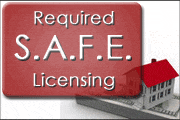 Loan Officer Licensing
Loan Officer Licensing
You must pass the SAFE / NMLS license to become a Mortgage Loan Officer.
More Details: https://www.themortgagetrainingcenter.com/mortgage-broker-license-requirements- Loan Processor
Loan Processors typically do the hard work accumulating required documents, calculating pre-qualification issues such as Loan-To-Value, working with the appraiser, et., then double checking the paperwork, correcting any errors, and corresponding with the underwriter to make sure the loan is approved.
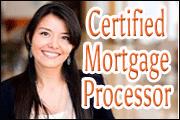
Training Options: Basic Loan Processing, Loan Processor Boot Camp, Loan Processor Certification
More Details: https://www.TheMortgageTrainingCenter.com/loan_processor_training.asp
- Loan Underwriter
The underwriter's primary job is to make sure the borrower can meet all of the guidelines and requirements of the mortgage program - and has the ability to repay the loan. Mortgage Underwriters do this by reviewing the applicant's W2's, tax returns, pay stubs, credit report, home appraisal, etc.
Training Options: Basic Loan Underwriting, Loan Underwriter Boot Camp, Loan Underwriter Certification
More Details: https://www.TheMortgageTrainingCenter.com/mortgage-underwriter-training
LOAN TYPES
- FHA
An FHA loan is a type of government-backed mortgage insured by the Federal Housing Administration, a branch of the U.S. Department of Housing and Urban Development, or HUD. FHA borrowers pay for mortgage insurance, which protects the lender from a loss if the borrower defaults on the loan.
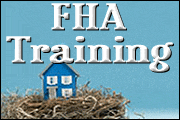
More Details: https://www.TheMortgageTrainingCenter.com/fha_training.asp
- VA
The VA - short for the Veteran's Administration - provides mortgage loans made through VA approved lenders. The properties these loans service are single family and multi-family homes, as well as manufactured homes and hospitals. With the increase in VA loan possibilities, VA loan processing is a vital piece in getting your loans to the closing table - but you'll need to know how to market and process this type of loan.
More Details: https://www.TheMortgageTrainingCenter.com/va_training.asp
- Conventional
A conventional loan, also known as a conforming loan, is a mortgage that is not guaranteed or insured by a government agency such as the Federal Housing Administration (FHA) or the Department of Veterans Affairs (VA). Conventional mortgages are "plain vanilla" home loans. They are typically fixed in their terms and rate, and follow fairly conservative guidelines.
More Details: https://www.TheMortgageTrainingCenter.com/conventional_loan_training.asp
- Commercial
By taking one of our commercial loan training courses, you will learn about the entire loan process by which a commercial real estate loan is marketed, underwritten, approved, documented, closed, and monitored. You also will learn about the various documents typically found in a commercial loan transaction - and their legal impact on the relationship between the bank and its borrowers and guarantors.
More Details: https://www.TheMortgageTrainingCenter.com/commercialmortgagebrokertraining.asp
HOW TO DO THE WORK
The following are training courses for how to do the essential details of a variety of loan types and functions:
Find Seminars, Webinars, And Online Training In Your Area


 Loan Officer Licensing
Loan Officer Licensing

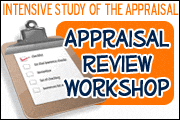

 1-770-410-1219
1-770-410-1219
 support@TheMortgageTrainingCenter.com
support@TheMortgageTrainingCenter.com


